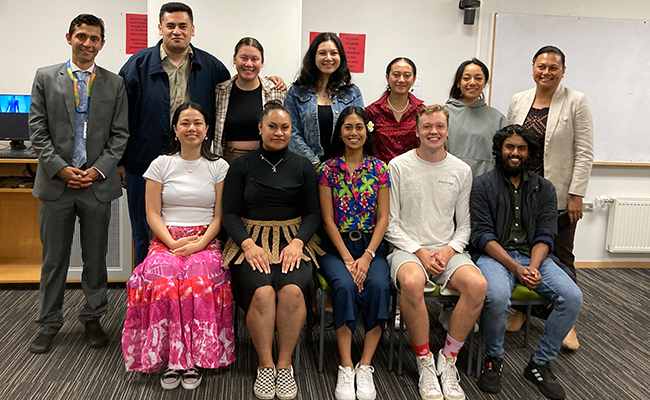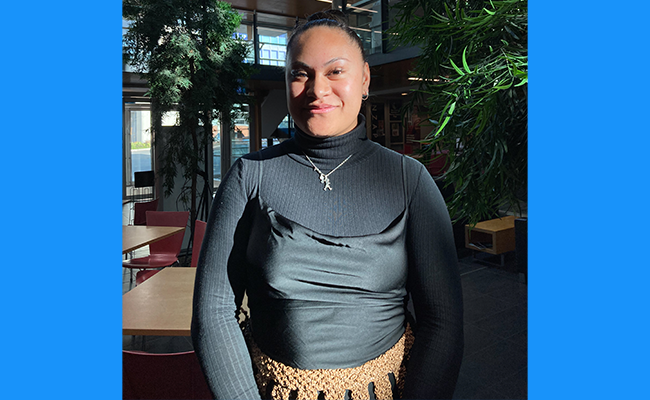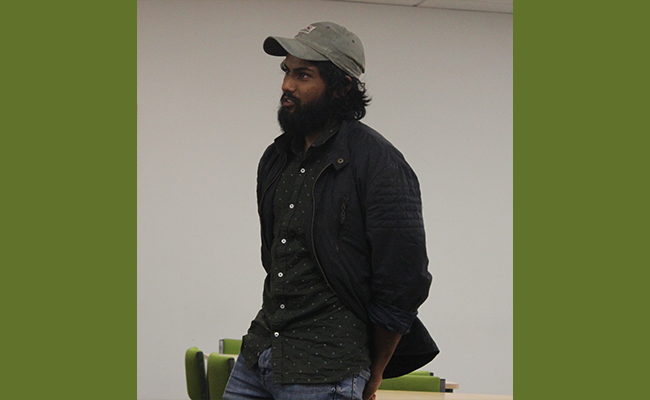
Pacific Tauira in the Rural Medical Immersion Programme joined by Dr Xaviour Walker (left) and Dr Letava Tafuna'i.
Pacific medical students are preparing to learn the art of making do.
In a first for the Rural Medical Immersion Programme (RMIP), Pacific medical tauira make up a large portion (10/25) of students accepted into the highly competitive experiential learning course.
The RMIP gives tauira the opportunity to earn their medical degree while learning from community, primary, secondary and tertiary healthcare professionals based in rural locations.
Pacific fifth year tauira will live and work within a small community, learning about the challenges, and charm, that come with the territory.
The course accepts 25 tauira annually, and this year Pacific students gained ten of the sought-after spots.
Students who wish to be selected for the programme must apply in writing, after which they are interviewed.
Co-Director of the Rural Medical Immersion Programme Dr Emma Boddington says there were many applicants for this academic year.
“All the students who applied were of an extremely high calibre, so competition was tough.”

Rural Medical Immersion Programme student Melenia Kaita'eifo
Dr Letava Tafuna'i says the programme allows students to form a deeper connection with the small community they will serve.
“By understanding how people live, you understand how we make decisions and why we make decisions.
“Being Pacific, everything is community and family focused. This just brings us back to how we do things, in a pacific way, which is with the community.”
RMIP student Melenia Kaita'eifo, bound for Masterton, dreams of one day practising medicine in Tonga, and felt the programme would give her the relevant experience.
“I know that Tonga is very under-resourced, and I've seen it myself, so I wanted to gain the skills early on with how to treat or manage diseases as best we can with very little resources.
“I don't think I would learn that in big city hospitals.”
Melenia says she wants to make her parents dream of moving back to Tonga a reality because of the sacrifices they made for her.
“I think they deserve all the good things in life.
“So, when I'm struggling to get up in the morning, I'm like 'oh gosh, my parents are getting up, despite being tired, at 4am to work so that they can support me and my dreams'.”

Rural Medical Immersion Programme student Ameil Khan.
Her drive to become a doctor stems from the unanswered questions she had as a child when her brother suddenly passed away.
“I was like eight, right? So I didn't know much. I had a lot of questions, but you're a kid so everyone's like 'just cry'.”
The poor level of care her family received at the hospital during this difficult time also drove her towards the profession.
“I just wanted to make people feel cared for. I wanted at least to be on the table, in a health setting, to be able to make other Tongan families feel comfortable and supported, especially when they're facing challenges like that.”
Amiel Khan, who will serve a small community in Ashburton, says applying for the programme was “a given”.
He grew up in the rural town of Te Kūiti and fell in love with the people, land and lifestyle.
He says he wants to give what he can to support these small communities like the one that shaped his childhood.
“But it's also about getting those hands-on skills and enjoying the amazing backyard of New Zealand as well, because rural places have mean backyards.”
Professor Rose Richards had a rural upbringing herself and has seen the need for Pacific doctors in these communities first-hand.
“I was just thinking about when I was a teenager and me and my mum would drive for an hour, trying to find even just a female doctor.
“The idea of being able to see a Pacific doctor in a rural setting, I don't think I ever imagined that was possible.”
RMIP tauira set off on their respective placements this week.
- Kōrero by Keilah Fox
